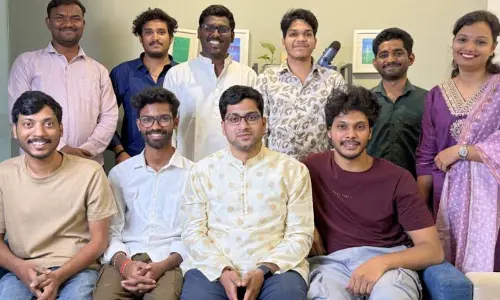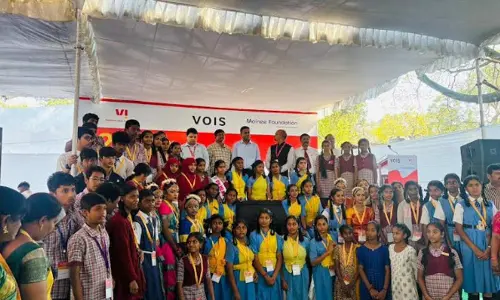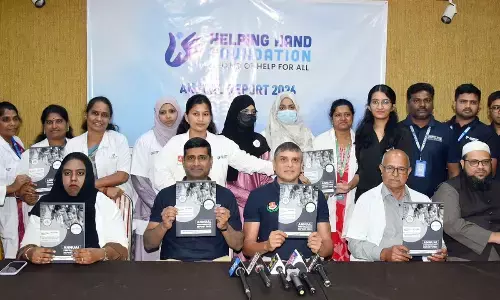Enjoy the beauty of knowledge by crisscrossing disciplines

Fortunately, I always got an opportunity to speak on diverse subjects. At a time when knowledge is increasingly getting compartmentalised, an inter-play of various branches of knowledge is exciting and illuminating.
Fortunately, I always got an opportunity to speak on diverse subjects. At a time when knowledge is increasingly getting compartmentalised, an inter-play of various branches of knowledge is exciting and illuminating.
It’s wrong to think that someone who mastered a particular subject cannot learn any other. I am an electronics graduate but a post graduate in journalism with a doctorate in political science but was a visiting professor in the Department of Economics in Birla Institute of Technology and Sciences (BITS).
Nothing prevented me from moving from electronics to economics. The driving force is the passion for learning multiple disciplines and the necessity to explore varied subjects.
Taste it, it‘s always amusing to crisscross between various subjects. When different branches of knowledge interact and interface, exciting insights emerge.
The classic example is when Albert Einstein met Rabindranath Tagore; the twentieth century’s greatest physicist meets the century’s equally great philosopher poet, what could have been the conversation?
Tagore visited Einstein at his residence in Kaputh in the suburbs of Berlin on July 14, 1930. The conversation was originally published in The Religion of Man (George, Allen & Unwin, Ltd. London), Appendix II, pp. 222-225.
It goes like this:
Einstein: Clouds look as one from a distance, but if you see them from nearby, they show themselves as disorderly drops of water.
Tagore: I find its parallel in human psychology. Our passions and desires are unruly, but our character subdues these elements into a harmonious whole. It is the constant harmony of chance and determination, which makes it eternally new and living.
Einstein: I believe that whatever we do or live for has its causality; it is good, however, that we cannot see through it.
This is the philosophical depth that emerges out of the meeting of a genius in physics and one with a similar standing in literature.
Similarly, William Shakespeare’s plays had a formative influence on the development of Marxism and psycho-analysis. Marx used lines from ‘The Merchant of Venice’ and ‘Timon of Athens’ to develop his economic theory and his theory of consciousness.
Sigmund Freud used his reading of ‘Hamlet’ to develop the acclaimed theory of Oedipus complex (Smith, Christian, (2012) Shakespeare’s influence on Marx, Freud and Frankfurt school critical theorists. PhD thesis, University of Warwick).
I come across many students coming with a science background attributing their inability to comprehend social sciences to their academic discipline. But, such an assumption is erroneous.
In fact, my experience suggests that my training in mathematics helped me a lot in political analysis too. The logic and its rigour mathematics offers can help in understanding social, economic and political phenomena too.
In the ‘Republic’, Plato argued that the study of arithmetic has a positive effect on individuals, compelling them to reason about abstract numbers. Reasoning out numbers has an application in everyone’s life and profession. One who is good at mathematics can replicate the acumen in business.
When I visited Massachusetts Institute of Technology (MIT), I saw a board, which gave the description of Subra Suresh, Dean of the School of Engineering and current president of Carnegie Mellon University. He is a mechanical engineer doing research in malaria.
He was studying the mechanical properties of red blood corpuscles (RBCs). His research helped in the discoveries of possible connections between cellular nano-mechanical processes and human disease states.
John Forbes Nash Jr. an American mathematician developed fundamental contributions to game theory, differential geometry, and the study of partial differential equations.
These concepts have provided an insight into the factors that govern chance and decision making inside complex systems found in daily life. His theories are used in economics, computing, evolutionary biology, artificial intelligence, accounting, computer science, games of skill, politics and military theory.
This shows how an ever lively mind can be a source of fertile ideas that have a multitude of uses.
Guess what! Nash is a mathematician, who won the Nobel prize in economics.
Dr APJ Abdul Kalam is popularly known as the ‘Missile Man’. But, his contribution in medical sciences is of equal importance.
In 1998, the distinguished surgical cardiologist Dr Soma Raju and Kalam developed a low-cost coronary stent, named the ‘Kalam-Raju Stent’.
In 2012, the duo designed a rugged tablet computer for health care in rural areas, which was named the ‘Kalam-Raju Tablet’. This is the collaborative benefit of a synthesis of sciences.
New frontiers of knowledge are emerging with synergy and symbiosis between different subjects.
Biology interacts with information technology to create Bio-informatics, which is an inter-disciplinary field that develops methods and software tools for understanding biological data.
Bio-informatics helps in understanding the genetic basis of diseases. The expansion of such knowledge can be a boon for many students, who have an interest in one area but for a host of reasons land up in some other academic field.
A student who is interested in biology but for reasons beyond his control has to pursue computer science need not get frustrated. He now has an option to pursue Bio-informatics, which combines his chosen field with the field in which he has interest.
That is the blessing in disguise for such individuals. As Gyan Nagpal says in ‘Talent Economics: The Fine Line Between Winning and Losing the Global War for Talent’ “Breakthrough innovation occurs when we bring down boundaries and encourage disciplines to learn from each other”.
That is the joy of being into two contrasting but closely inter-linked fields!










